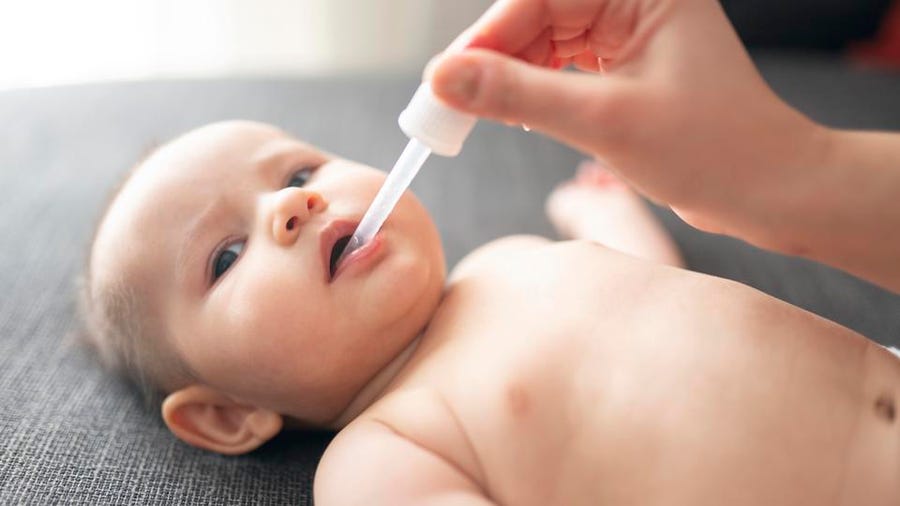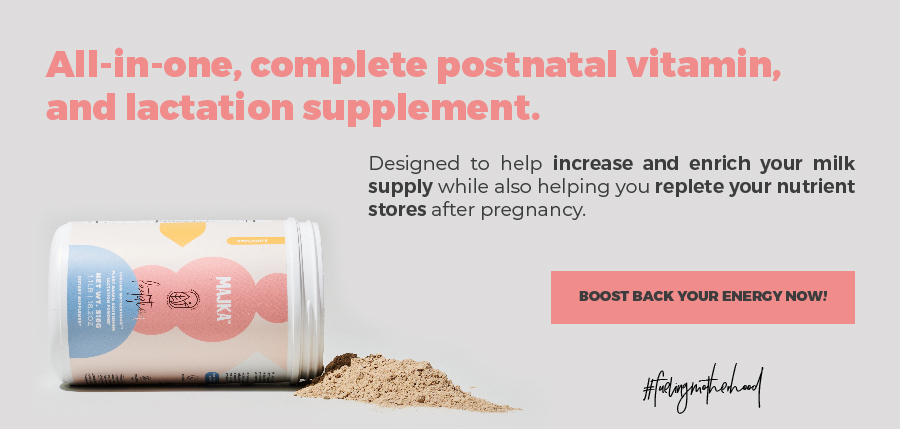
In this article, we want to take a deeper look into baby probiotics so you can make the decision that works best for you and your baby.
Baby Probiotics
The International Scientific Association for Probiotics and Prebiotics (ISAPP) defines probiotics as “live microorganisms that, when administered in adequate amounts, confer a health benefit on the host”.
These live microorganisms are found in fermented food like yogurt and supplements.
They create healthy bacteria in the digestive tract of adults and babies, but each needs its amount and kind. There are different types of bacteria with different strains including: lactobacillus, saccharomyces, bifidobacterium, etc. These are just some of the most common strains of probiotics found in baby supplements.
*Colony-forming units (CFUs) refer to the number of active microorganisms in a probiotic supplement.
What do probiotics do for babies?
When your baby is born, his/her gut is sterile. After birth, your baby will naturally introduce bacteria through breast milk, formula, and solids.
This bacteria will help him/her get the nutrients needed for proper digestion. Good bacteria will also aid in the development of his/hers immune system. Probiotics can destroy cells that cause disease. Probiotic supplements are made to help all this happen when your baby isn’t getting the healthy bacteria that is needed.
If your baby is taking antibiotics, his/her gut colonization could be compromised as they defend from bad bacteria. However, antibiotics also kill off healthy bacteria. In this case, probiotics will help colonize your baby’s good gut bacteria again.
As the type and amount of probiotics are different, probiotics may be of help if your baby is found to not have enough healthy bacteria or not every kind that he/she needs.
Probiotics have also been found to help with irritable bowel syndrome (IBS) symptoms, but the magnitude of benefit and the most effective species still need more research.
Many sources are saying that probiotics help with food allergies, asthma, reflux and so; but as this may be true there isn’t enough evidence to confirm it, and more research has to be done.
Keep in mind that supplement probiotics, as any supplement, don’t have the Food and Drug Administration confirmation of their benefits even though some brands may affirm them in their tags: this does not mean they have been confirmed by a scientific search, so always ask your healthcare provider before giving your baby any supplement.
Can I take probiotics if I’m breastfeeding?
Studies have found that probiotics do not appear to pose any safety concerns for lactating moms (nor in pregnancy); they aren’t expected to transfer into breastmilk, so if you are taking probiotics supplements they will not go into your milk.
Does breast milk have probiotics?
Your breast milk will naturally provide your baby with the nutrients that he/she needs. It is a source of probiotics (milk microbiota) and prebiotics (HMOs) which help to establish your baby´s microbiota.
Does formula have probiotics?
Infant formula is an alternative to human milk and efforts have been made to mimic the properties so babies that don’t get breast milk still get all the benefits of it. For this, probiotics have been added to the formula so your baby’s microbiome can develop as healthy as possible (this is recent and some formulas may not have it).
*The appropriate formula for your baby has to be chosen regarding his/her needs and this will be your doctor’s call.
Are there any consequences of probiotics on my baby?
First of all, it is important to always check with your doctor before giving your baby any supplements as every child is different and has their own needs. Also, you may want to keep in mind that the general effects of probiotics are still being studied and new information may come up, but as of today probiotics are considered safe in children. Even so, It’s important to check with your healthcare provider what dosage works best for your baby and for how long, as something may work only in a specific dose or time.
Baby probiotics side effects
It’s unlikely that your baby has any side effects regarding probiotics, but if your baby is suddenly having diarrhea, nausea, vomiting, gas, or bloating after supplementing with probiotics these may be side effects of them. If you notice this, stop the supplement and visit your doctor to make sure everything is ok and a different supplement could be the option.
In Breastfeeding 101 we hope this information has helped you to know what probiotics are and how they may help your baby. We invite you to follow all our content to learn more about your baby’s health.
If you want to learn more about baby’s probiotics we share with you some of the sources that made this article possible:
Are probiotics safe for use during pregnancy and lactation? I National Library of Medicine
Baby probiotics: Are they safe?
Baby Probiotics: Everything You Need To Know I ForbesHealth
Clinical Efficacy of Probiotics: Review of the Evidence With Focus on Children I Journal of Pediatric Gastroenterology and Nutrition
Effects of Infant Formula Supplemented With Prebiotics and OPO on Infancy Fecal Microbiota: A Pilot Randomized Clinical Trial I National Library of Medicine
Effects of probiotics on child growth: a systematic review I BMC Journal of Health, Population, and Nutrition
Probiotics and Preterm Infants: A Position Paper by the European Society for Paediatric Gastroenterology Hepatology and Nutrition Committee on Nutrition and the European Society for Paediatric Gastroenterology Hepatology and Nutrition Working Group for Probiotics and Prebiotics I National Library of Medicine
Probiotic drops for Babies – Information for families I NHS
Probiotics’ efficacy in pediatric diseases: which is the evidence? A critical review on behalf of the Italian Society of Pediatrics I BMC Italian Journal of Pediatrics
Probiotics in Pediatrics. A Review and Practical Guide I National Library of Medicine
Probiotic supplementation and associated infant gut microbiome and health: a cautionary retrospective clinical comparison I Scientific reports
Probiotic Supplementation during the Perinatal and Infant Period: Effects on gut Dysbiosis and Disease I National Library of Medicine
The Prebiotic and Probiotic Properties of Human Milk: Implications for Infant Immune Development and Pediatric Asthma I National Library of Medicine
Supplementation of infant formula with probiotics and/or prebiotics: a systematic review and comment by the ESPGHAN committee on nutrition I National Library of Medicine
Avery Reckers





